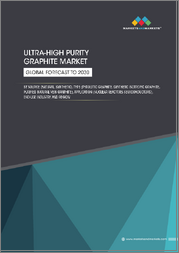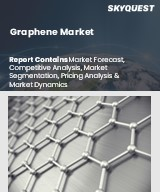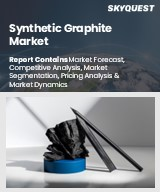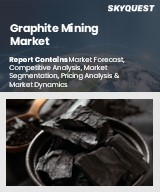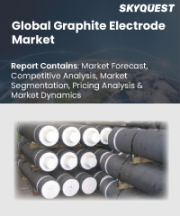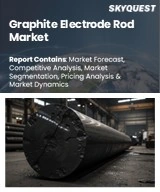
|
시장보고서
상품코드
1750520
탄화탄탈럼(TaC) 시장 : 시장 기회, 성장 촉진요인, 산업 동향 분석, 예측(2025-2034년)Tantalum Carbide Market Opportunity, Growth Drivers, Industry Trend Analysis, and Forecast 2025 - 2034 |
||||||
세계의 탄화탄탈럼 시장은 2024년에는 1억 9,080만 달러로 평가되었고, CAGR 6%로 성장할 전망이며, 2034년에는 3억 4,100만 달러에 이를 것으로 예측되고 있습니다.
탄화탄탈럼(TaC)은 탁월한 경도, 매우 높은 융점, 우수한 열전도성과 전기전도성으로 알려져 있습니다. 이러한 독특한 특성은, 다양한 분야에서의 수요의 고조에 크게 공헌하고 있습니다. 산업계가 가혹한 조건에 견딜 소재를 찾으면서 탄화탄탈럼의 매력은 점점 높아지고 있습니다. 시장의 확대는 전자, 공업 제조 및 기타 고성능 분야에서의 사용량 증가에 의해 추진되고 있습니다.
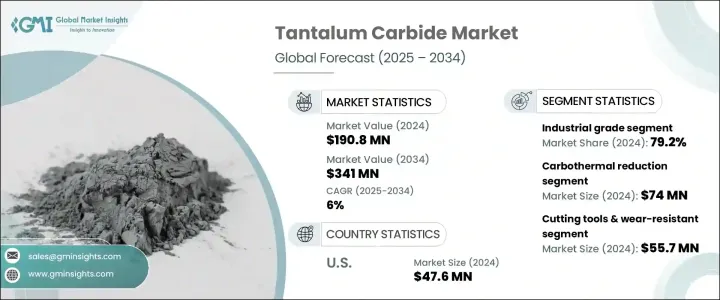
게다가, 새로운 제조 기술은 탄화탄탈럼의 적용을 넓히고, 보다 유연한 설계와 커스텀 용도의 기회를 제공합니다. 그러나 이 시장은 높은 채굴 비용 및 생산 비용에 더해 탄탈럼 채굴이 환경에 미치는 영향에 관한 과제에 여전히 직면해 있습니다. 이러한 제약이 있음에도 불구하고 현재 진행 중인 연구개발 및 제조효율 향상으로 탄화탄탈럼 솔루션의 비용 대비 효과와 확장성이 향상되어 미래 시장 개척에 유리한 전망을 얻을 수 있을 것으로 기대됩니다.
| 시장 규모 | |
|---|---|
| 시작 연도 | 2024년 |
| 예측 연도 | 2025-2034년 |
| 시작 금액 | 1억 9,080만 달러 |
| 예측 금액 | 3억 4,100만 달러 |
| CAGR | 6% |
2024년에는 산업용 등급이 79.2%의 점유율을 차지했으며, 1억 5,110만 달러 시장 규모가 되었습니다. 이 부문은, 고온하에서 조업하는 산업이나, 내마모성이 뛰어난 재료를 필요로 하는 산업에서 널리 채용되고 있습니다. 건설 및 대량생산에서 용도는 특히 응력하에서 성능을 발휘해야 하는 공구, 금형, 구조요소 때문에 공업용 Grade TaC의 열적 및 기계적 강도에 크게 의존하고 있습니다. 한편 연구 등급인 TaC는 첨단 세라믹 및 신시대 전자 재료와 관련된 실험적 작업에서의 사용으로 소소하지만 중요한 견인력이 되고 있습니다. 이 성장 틈새는 재료 과학의 혁신에 초점을 맞춘 학술적 및 산업적 연구 개발 이니셔티브에 의해 촉진되고 있습니다.
형상별로는 분말 부문이 호조를 보이며, 예측 기간 중 CAGR 6.4%로 성장할 전망이며, 2034년에는 1억 5,420만 달러에 달할 것으로 예측되고 있습니다. 분말의 형태는 소결 공정, 용사 코팅, 적층 조형 용도로 즐겨 사용됩니다. 그 미세한 텍스처는 특히 극단적인 마찰이나 온도 변동이 일어나기 쉬운 환경에서 사용되는 복잡한 부품의 개발에 있어 높은 정밀도를 가능하게 합니다. 분말 형상의 적응성으로 복잡한 형상의 부품을 만드는 데 이상적이며, 여러 고도의 생산 환경에서 중요한 재료가 되고 있습니다.
생산면에서 탄소열환원 분야는 2024년 7,400만 달러에 달했으며, CAGR 6.3%로 성장할 전망이고, 시장의 38.7%를 차지할 것으로 예상되고 있습니다. 이 방법은 특히 공업 등급의 TaC 생산에서 그 비용 대비 효과와 확장성으로부터 여전히 지지받고 있습니다. 이 방법은 전통적인 것이지만, 그 신뢰성과 일관된 재료 품질을 제공하는 능력으로 인해 대규모 제조에서는 여전히 보급되고 있습니다. 동시에 산업계가 특정 용도를 위한 초고순도 TaC 조성을 요구함에 따라 다른 생산 기술이 대두되고 있습니다. 이러한 배경에서 특히 까다로운 기술 사양을 충족하는 데 중점을 두는 제조업체들 사이에서는 대체 증착법에 대한 수요가 증가하고 있습니다.
용도별로는 절삭 공구와 내마모성 부품이 2024년 시장에 5,570만 달러 이상 공헌했습니다. 이러한 부품은 밀링 가공, 성형, 기타 고부하가 걸리는 공업 프로세스에서의 작업에 불가결합니다. 탄화탄탈럼의 고경도 및 내열성은 심한 기계적 마모 및 열에 노출되는 공구 및 부품에 이상적입니다. 또한 고온 부품은 특히 장기적인 열충격 내성이 작업 효율에 필수적이기 때문에 사용량이 계속 증가하고 있습니다.
최종 사용자 산업에 눈을 돌리면 항공우주 및 방위 부문은 2034년까지 1억 950만 달러를 돌파할 전망이며, CAGR 6.8%로 성장할 것으로 예측됩니다. 이 분야는 여전히 시장 성장에 가장 역동적으로 기여하는 분야 중 하나입니다. 선진적인 방위 시스템 및 항공 우주 부품에서는 내구성이 있는 내열 재료가 필요하며, TaC의 지속적인 수요가 보증되고 있습니다. 금속 가공 부문 또한 효율을 높이고 장치의 다운타임을 줄이며 까다로운 조건에서 안정적인 생산량을 유지하기 위해 TaC의 성능상 이점에 크게 의존하고 있습니다.
지역적으로 미국의 탄화탄탈럼 시장은 2024년에 4,760만 달러의 평가액에 이르렀으며, 2034년까지 연평균 복합 성장률(CAGR) 6.2%를 보일 것으로 예측됩니다. 이 나라의 견고한 산업 인프라는 항공우주, 방위 및 기술 혁신의 리더십과 함께 강력한 내수를 지원합니다. 미국은 계속 TaC와 같은 고성능 재료의 유력한 소비국이며, 연구 주도의 용도 및 부문을 넘어선 기술 개발에 중점을 두고 있습니다.
경쟁 구도를 형성하는 주요 기업으로는 Hunan Fushel Technology, Edgetech Industries, ABSCO, H.C. Starck Tungsten, 및 Ningxia Orient Tantalum Industry 등이 있습니다. 이러한 기업들은 대규모 제조 능력 및 기술 전문 지식의 조합을 활용하여 발판을 유지하고 있습니다. 경쟁 환경은 기술적 진보, 생산 능력, 산업 등급 제조에서 맞춤형 용도까지 다양한 최종 이용 산업에 대응하는 능력에 중점을 두고 있는 것이 특징입니다.
목차
제1장 조사 방법 및 범위
제2장 주요 요약
제3장 업계 인사이트
- 생태계 분석
- 밸류체인에 영향을 주는 요인
- 이익률 분석
- 혁신
- 장래의 전망
- 제조업자
- 리셀러
- 트럼프 정권에 의한 관세에 대한 영향
- 무역에 미치는 영향
- 무역량의 혼란
- 보복 조치
- 업계에 미치는 영향
- 공급측의 영향(원재료)
- 주요 원재료의 가격 변동
- 공급망 구조
- 생산 비용에 미치는 영향
- 공급측의 영향(원재료)
- 수요측의 영향(판매가격)
- 최종 시장에 대한 가격 전달
- 시장 점유율 동향
- 소비자의 반응 패턴
- 영향을 받는 주요 기업
- 전략적인 업계 대응
- 공급망 재구성
- 가격 설정 및 제품 전략
- 정책관여
- 전망 및 향후 검토 사항
- 무역에 미치는 영향
- 무역 통계(HS코드)
- 주요 수출국(2021-2024년)
- 주요 수입국(2021-2024년)
참고 : 위의 무역 통계는 주요 국가에 대해서만 제공됩니다.
- 공급자의 상황
- 이익률 분석
- 주요 뉴스 및 대처
- 규제 상황
- 영향요인
- 성장 촉진요인
- 항공우주 및 방위 산업의 성장
- 선진 전자기기 및 반도체 보급
- 적층 조형(3D 프린팅) 채용 증가
- 고성능 코팅 및 툴에 대한 주력 강화
- 업계의 잠재적 위험 및 과제
- 높은 생산 및 가공 비용
- 공급망 및 원재료의 제약
- 환경 및 규제상 과제
- 성장 촉진요인
- 규제 프레임워크 및 기준
- 재료 품질 기준
- 무역규제 및 관세
- 환경규제
- 분쟁광물법
- 직장 안전 기준
- 제조 공정 분석
- 원재료 준비
- 합성 방법
- 분말가공
- 소결과 치밀화
- 마무리 작업
- 시장 기회
- 성장 가능성 분석
- Porter's Five Forces 분석
- PESTEL 분석
제4장 경쟁 구도
- 서문
- 시장 점유율 분석
- 전략 틀
- 합병 및 인수
- 합작 투자 및 콜라보레이션
- 신제품 개발
- 확대 전략
- 경쟁 벤치마킹
- 벤더 상황
- 경쟁 포지셔닝 매트릭스
- 전략적 대시보드
- 특허 분석 및 혁신평가
- 신규 참가자 시장 진출 전략
- 생산 능력 분석
제5장 시장 추계 및 예측 : 학년별(2021-2034년)
- 주요 동향
- 공업용 등급
- 고순도 등급
- 순도 99%
- 순도 99.5%
- 순도 99.9%
- 기타 고순도 등급
- 고순도 등급
- 조사 등급
- 기타 등급
제6장 시장 추계 및 예측 : 형태별(2021-2034년)
- 주요 동향
- 분말
- 나노 파우더
- 마이크로 파우더
- 기타 파우더 형태
- 스퍼터링 타겟
- 벌크 컴포넌트
- 코팅
- 기타 형식
제7장 시장 추계 및 예측 : 제조 방법별(2021-2034년)
- 주요 동향
- 고체 반응
- 탄소 열 환원
- 화학 증착(CVD)
- 자기 증식형 고온 합성(SHS)
- 기타 제조방법
제8장 시장 추계 및 예측 : 용도별(2021-2034년)
- 주요 동향
- 절삭 공구 및 내마모 부품
- 절삭 인서트
- 밀링 공구
- 드릴링 툴
- 마모 부품
- 기타 절삭 및 마모 용도
- 고온 부품
- 퍼니스 요소
- 열 보호 시스템
- 로켓 노즐
- 기타 고온 용도
- 초경합금
- 곡물 성장 억제제
- 바인더상의 성분
- 기타 초경합금의 용도
- 일렉트로닉스 및 반도체
- 박막 저항기
- 배리어층
- 기타 전자 기기 용도
- 코팅
- 하드 코팅
- 내부식 코팅
- 기타 코팅 용도
- 화학처리 장치
- 기타 용도
제9장 시장 추계 및 예측 : 최종 이용 산업별(2021-2034년)
- 주요 동향
- 항공우주 및 방위
- 항공기 부품
- 미사일 시스템
- 우주선
- 기타 항공우주 및 방위 용도
- 금속가공
- 절삭 공구 업계
- 기계 가공 작업
- 금속 성형
- 기타 금속 가공 용도
- 광업 및 건설
- 일렉트로닉스 및 반도체
- 화학 및 석유화학
- 에너지 및 발전
- 연구 및 학술
- 기타 최종 이용 산업
제10장 시장 추계 및 예측 : 지역별(2021-2034년)
- 주요 동향
- 북미
- 미국
- 캐나다
- 유럽
- 영국
- 독일
- 프랑스
- 이탈리아
- 스페인
- 기타 유럽
- 아시아태평양
- 중국
- 인도
- 일본
- 한국
- 호주
- 기타 아시아태평양
- 라틴아메리카
- 브라질
- 멕시코
- 아르헨티나
- 기타 라틴아메리카
- 중동 및 아프리카
- 남아프리카
- 사우디아라비아
- 아랍에미리트(UAE)
- 기타 중동 및 아프리카
제11장 기업 프로파일
- ABSCO
- ALB Materials
- Edgetech Industries
- HC Starck Tungsten
- Hunan Fushel Technology
- Ningxia Orient Tantalum Industry
- Otto Chemie
- Reade
- Semicera Semiconductor
- Stanford Advanced Materials
- Treibacher
- Yanling Jincheng Tantalum & Niobium
The Global Tantalum Carbide Market was valued at USD 190.8 million in 2024 and is estimated to grow at a CAGR of 6% to reach USD 341 million by 2034. Tantalum carbide (TaC) is known for its exceptional hardness, extremely high melting point, and superior thermal and electrical conductivity. These unique attributes are contributing significantly to its rising demand across various sectors. As industries increasingly require materials capable of withstanding extreme conditions, the appeal of tantalum carbide continues to grow. Market expansion is being propelled by heightened usage across electronics, industrial manufacturing, and other high-performance sectors.

Furthermore, emerging manufacturing technologies are widening the scope for tantalum carbide, offering opportunities for greater design flexibility and custom applications. However, the market still faces challenges related to the environmental impact of tantalum mining, alongside high mining and production costs. Despite these constraints, ongoing research and advancements in manufacturing efficiencies are expected to enhance the cost-effectiveness and scalability of tantalum carbide solutions, thereby creating a favorable outlook for future market development.
| Market Scope | |
|---|---|
| Start Year | 2024 |
| Forecast Year | 2025-2034 |
| Start Value | $190.8 Million |
| Forecast Value | $341 Million |
| CAGR | 6% |
In 2024, the industrial grade segment dominated the market with a substantial 79.2% share, valued at USD 151.1 million. This segment is widely adopted across industries that operate under high temperatures or require materials with exceptional resistance to abrasion. Applications in construction and mass manufacturing rely heavily on the thermal and mechanical strength of industrial grade TaC, particularly for tools, dies, and structural elements that must perform under stress. Meanwhile, research grade TaC is gaining modest but important traction, driven by its use in experimental work related to advanced ceramics and new-age electronic materials. This growing niche is fueled by academic and industrial R&D initiatives focused on innovation in material science.
By form, the powder segment is showing strong performance, projected to reach USD 154.2 million by 2034 with a CAGR of 6.4% during the forecast period. The powder form is a preferred input for sintering processes, thermal spray coatings, and additive manufacturing applications. Its fine texture allows for high precision in developing intricate components, particularly those used in environments prone to extreme friction and temperature fluctuations. The adaptability of the powder form makes it ideal for crafting components with complex geometries, making it a critical material in multiple advanced production settings.
Production-wise, the carbothermal reduction segment stood at USD 74 million in 2024 and is expected to grow at a 6.3% CAGR, accounting for 38.7% of the market. This method remains favored for its cost-effectiveness and scalability, particularly in the production of industrial-grade TaC. While traditional in nature, this approach remains prevalent in large-scale manufacturing due to its reliability and ability to deliver consistent material quality. At the same time, other production techniques are gaining ground as industries seek ultra-pure TaC compositions for specific applications. In this context, the demand for alternative deposition methods is on the rise, especially among manufacturers focused on meeting stringent technical specifications.
In terms of application, cutting tools and wear-resistant components contributed over USD 55.7 million to the market in 2024. These components are crucial for operations involving milling, shaping, and other high-stress industrial processes. The high hardness and thermal resilience of tantalum carbide make it ideal for tools and parts that are subject to intense mechanical wear and heat exposure. Additionally, high-temperature parts continue to find increased usage, particularly where long-term thermal shock resistance is essential to operational efficiency.
Looking at end-user industries, the aerospace and defense sector is forecasted to surpass USD 109.5 million by 2034, advancing at a 6.8% CAGR. This segment remains one of the most dynamic contributors to market growth. The need for durable, heat-resistant materials in advanced defense systems and aerospace components ensures continued demand for TaC. The metal processing sector also leans heavily on TaC's performance benefits to enhance efficiency, reduce equipment downtime, and maintain consistent output under challenging conditions.
Regionally, the U.S. tantalum carbide market reached a valuation of USD 47.6 million in 2024 and is projected to grow at a 6.2% CAGR through 2034. The country's robust industrial infrastructure, along with its leadership in aerospace, defense, and technological innovation, supports strong domestic demand. The U.S. continues to be a prominent consumer of high-performance materials like TaC, with a growing focus on research-driven applications and technological development across sectors.
Major players shaping the competitive landscape include Hunan Fushel Technology, Edgetech Industries, ABSCO, H.C. Starck Tungsten, and Ningxia Orient Tantalum Industry. These companies leverage a combination of large-scale manufacturing capabilities and technical expertise to maintain their foothold. The competitive environment is marked by the emphasis on technological advancement, production capacity, and the ability to serve a wide spectrum of end-use industries, from industrial-grade manufacturing to customized applications.
Table of Contents
Chapter 1 Methodology & Scope
- 1.1 Market scope & definitions
- 1.2 Base estimates & calculations
- 1.3 Forecast calculations
- 1.4 Data sources
- 1.4.1 Primary
- 1.4.2 Secondary
- 1.4.2.1 Paid sources
- 1.4.2.2 Public sources
Chapter 2 Executive Summary
- 2.1 Industry synopsis, 2021 - 2034
Chapter 3 Industry Insights
- 3.1 Industry ecosystem analysis
- 3.1.1 Factor affecting the value chain
- 3.1.2 Profit margin analysis
- 3.1.3 Disruptions
- 3.1.4 Future outlook
- 3.1.5 Manufacturers
- 3.1.6 Distributors
- 3.2 Trump administration tariffs
- 3.2.1 Impact on trade
- 3.2.1.1 Trade volume disruptions
- 3.2.1.2 Retaliatory measures
- 3.2.2 Impact on the industry
- 3.2.2.1 Supply-side impact (raw materials)
- 3.2.2.1.1 Price volatility in key materials
- 3.2.2.1.2 Supply chain structure
- 3.2.2.1.3 Production cost implications
- 3.2.2.1 Supply-side impact (raw materials)
- 3.2.3 Demand-side impact (selling price)
- 3.2.3.1 Price transmission to end markets
- 3.2.3.2 Market share dynamics
- 3.2.3.3 Consumer response patterns
- 3.2.4 Key companies impacted
- 3.2.5 Strategic industry responses
- 3.2.5.1 Supply chain reconfiguration
- 3.2.5.2 Pricing and product strategies
- 3.2.5.3 Policy engagement
- 3.2.6 Outlook and future considerations
- 3.2.1 Impact on trade
- 3.3 Trade statistics (HS code)
- 3.3.1 Major exporting countries, 2021-2024 (kilo tons)
- 3.3.2 Major importing countries, 2021-2024 (kilo tons)
Note: the above trade statistics will be provided for key countries only.
- 3.4 Supplier landscape
- 3.5 Profit margin analysis
- 3.6 Key news & initiatives
- 3.7 Regulatory landscape
- 3.8 Impact forces
- 3.8.1 Growth drivers
- 3.8.1.1 Growth in aerospace and defense industry
- 3.8.1.2 Proliferation of advanced electronics and semiconductors
- 3.8.1.3 Rising adoption in additive manufacturing (3D printing)
- 3.8.1.4 Increased focus on high-performance coatings and tooling
- 3.8.2 Industry pitfalls & challenges
- 3.8.2.1 High production and processing costs
- 3.8.2.2 Supply chain and raw material constraints
- 3.8.2.3 Environmental and regulatory challenges
- 3.8.1 Growth drivers
- 3.9 Regulatory framework & standards
- 3.9.1 Material quality standards
- 3.9.2 Trade regulations & tariffs
- 3.9.3 Environmental regulations
- 3.9.4 Conflict minerals legislation
- 3.9.5 Workplace safety standards
- 3.10 Manufacturing process analysis
- 3.10.1 Raw material preparation
- 3.10.2 Synthesis methods
- 3.10.3 Powder processing
- 3.10.4 Sintering & densification
- 3.10.5 Finishing operations
- 3.11 Market opportunities
- 3.12 Growth potential analysis
- 3.13 Porter's analysis
- 3.14 PESTEL analysis
Chapter 4 Competitive Landscape, 2024
- 4.1 Introduction
- 4.2 Market share analysis
- 4.3 Strategic framework
- 4.3.1 Mergers & acquisitions
- 4.3.2 Joint ventures & collaborations
- 4.3.3 New product developments
- 4.3.4 Expansion strategies
- 4.4 Competitive benchmarking
- 4.5 Vendor landscape
- 4.6 Competitive positioning matrix
- 4.7 Strategic dashboard
- 4.8 Patent analysis & innovation assessment
- 4.9 Market entry strategies for new players
- 4.10 Production capacity analysis
Chapter 5 Market Estimates & Forecast, By Grade, 2021 - 2034 (USD Million) (Kilo Tons)
- 5.1 Key trends
- 5.2 Industrial grade
- 5.2.1 High-purity grade
- 5.2.1.1 99% purity
- 5.2.1.2 99.5% purity
- 5.2.1.3 99.9% purity
- 5.2.1.4 Other high-purity grades
- 5.2.1 High-purity grade
- 5.3 Research grade
- 5.4 Other grades
Chapter 6 Market Estimates & Forecast, By Form, 2021 - 2034 (USD Million) (Kilo Tons)
- 6.1 Key trends
- 6.2 Powder
- 6.2.1 Nano powder
- 6.2.2 Micro powder
- 6.2.3 Other powder forms
- 6.3 Sputtering target
- 6.4 Bulk components
- 6.5 Coatings
- 6.6 Other forms
Chapter 7 Market Estimates & Forecast, By Production Method, 2021 - 2034 (USD Million) (Kilo Tons)
- 7.1 Key trends
- 7.2 Solid-state reaction
- 7.3 Carbothermal reduction
- 7.4 Chemical vapor deposition (CVD)
- 7.5 Self-propagating high-temperature synthesis (SHS)
- 7.6 Other production methods
Chapter 8 Market Estimates & Forecast, By Application, 2021 - 2034 (USD Million) (Kilo Tons)
- 8.1 Key trends
- 8.2 Cutting tools & wear-resistant components
- 8.2.1 Cutting inserts
- 8.2.2 Milling tools
- 8.2.3 Drilling tools
- 8.2.4 Wear parts
- 8.2.5 Other cutting & wear applications
- 8.3 High-temperature components
- 8.3.1 Furnace elements
- 8.3.2 Thermal protection systems
- 8.3.3 Rocket nozzles
- 8.3.4 Other high-temperature applications
- 8.4 Cemented carbides
- 8.4.1 Grain growth inhibitors
- 8.4.2 Binder phase components
- 8.4.3 Other cemented carbide applications
- 8.5 Electronics & semiconductor
- 8.5.1 Thin film resistors
- 8.5.2 Barrier layers
- 8.5.3 Other electronics applications
- 8.6 Coatings
- 8.6.1 Hard coatings
- 8.6.2 Corrosion-resistant coatings
- 8.6.3 Other coating applications
- 8.7 Chemical processing equipment
- 8.8 Other applications
Chapter 9 Market Estimates & Forecast, By End Use Industry, 2021 - 2034 (USD Million) (Kilo Tons)
- 9.1 Key trends
- 9.2 Aerospace & defense
- 9.2.1 Aircraft components
- 9.2.2 Missile systems
- 9.2.3 Space vehicles
- 9.2.4 Other aerospace & defense applications
- 9.3 Metal processing & metalworking
- 9.3.1 Cutting tool industry
- 9.3.2 Machining operations
- 9.3.3 Metal forming
- 9.3.4 Other metal processing applications
- 9.4 Mining & construction
- 9.5 Electronics & semiconductor
- 9.6 Chemical & petrochemical
- 9.7 Energy & power generation
- 9.8 Research & academia
- 9.9 Other end-use industries
Chapter 10 Market Estimates & Forecast, By Region, 2021 - 2034 (USD Million) (Kilo Tons)
- 10.1 Key trends
- 10.2 North America
- 10.2.1 U.S.
- 10.2.2 Canada
- 10.3 Europe
- 10.3.1 UK
- 10.3.2 Germany
- 10.3.3 France
- 10.3.4 Italy
- 10.3.5 Spain
- 10.3.6 Rest of Europe
- 10.4 Asia Pacific
- 10.4.1 China
- 10.4.2 India
- 10.4.3 Japan
- 10.4.4 South Korea
- 10.4.5 Australia
- 10.4.6 Rest of Asia Pacific
- 10.5 Latin America
- 10.5.1 Brazil
- 10.5.2 Mexico
- 10.5.3 Argentina
- 10.5.4 Rest of Latin America
- 10.6 MEA
- 10.6.1 South Africa
- 10.6.2 Saudi Arabia
- 10.6.3 UAE
- 10.6.4 Rest of Middle East and Africa
Chapter 11 Company Profiles
- 11.1 ABSCO
- 11.2 ALB Materials
- 11.3 Edgetech Industries
- 11.4 H.C. Starck Tungsten
- 11.5 Hunan Fushel Technology
- 11.6 Ningxia Orient Tantalum Industry
- 11.7 Otto Chemie
- 11.8 Reade
- 11.9 Semicera Semiconductor
- 11.10 Stanford Advanced Materials
- 11.11 Treibacher
- 11.12 Yanling Jincheng Tantalum & Niobium







